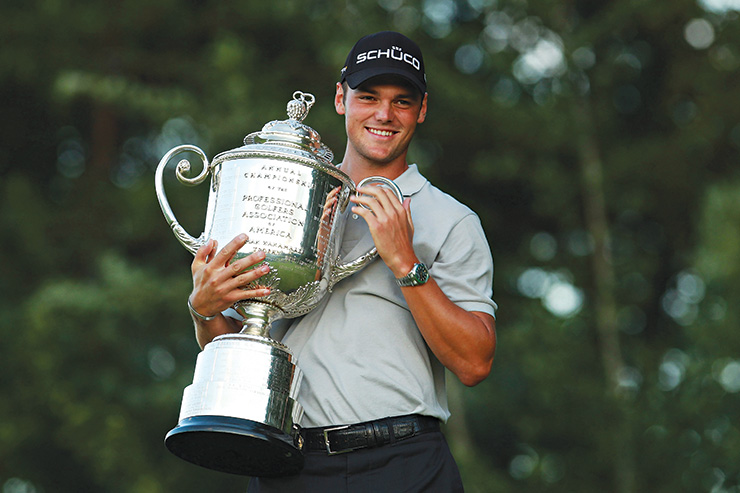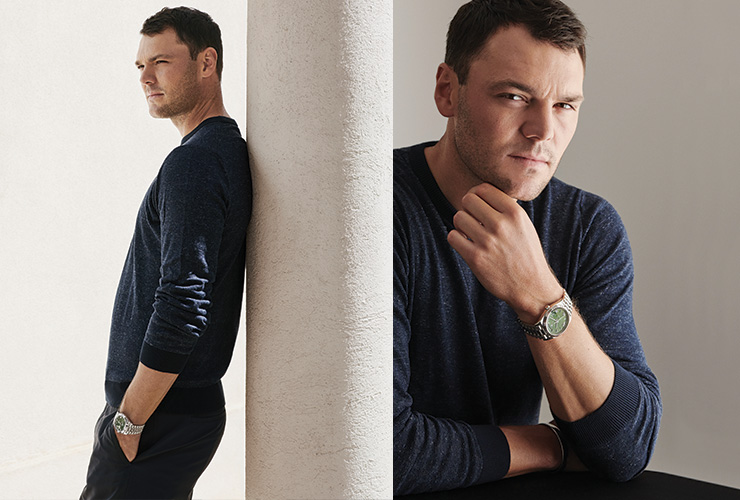The three-time Abu Dhabi HSBC Championship winner and Rolex Testimonee is a work in progress, on and off the course
By Kent Gray
When Martin Kaymer waltzed to his second major championship victory at the 2014 U.S. Open, it seemed the German had rediscovered the secret that had taken him to world No.1 three years earlier.
The wire-to-wire romp at fabled Pinehurst was a masterclass in not only closing out a fast start (back-to-back 65s for a U.S. Open record 130 aggregate) but winning going away as joint runners-up Rickie Fowler and Erik Compton can attest after finishing a distant eight shots in Kaymer’s rear-view mirror.
The now 34-year-old looked to be at it again on his beloved National course the following January when he opened the 2015 Abu Dhabi HSBC Championship with rounds of 64, 67 and 65 to hold a seemingly unassailable six-stroke lead. Indeed, when he extended that buffer to 10 shots after five holes on Sunday, it was not a matter of how, but by how many Kaymer would claim his fourth Falcon trophy. Expect Kaymer didn’t win, inexplicably sliding to third behind fast-finishing Frenchman Gary Stal and serial bridesmaid Rory McIlroy courtesy of a pair of horrendous drives which lead to a double bogey on the 9th and shocking sand and bush encrusted triple on 13.
Despite his repeated protestations to the contrary, it seems Kaymer has never recovered from the vexing events of that surprising Sunday even if he admitted at the time that he was “surprised” and “shocked…I don’t really know how to put it into words.” He certainly isn’t the same “effortless” player who edged Bubba Watson in a three-hole playoff at Whistling Straits to claim the 2010 PGA Championship, much less the star who spent eight weeks at No.1 in 2011 or the European hero who holed the putt to retain the Ryder Cup at Medinah Country Club the following year.

Kaymer edged Bubba Watson in a three-hole playoff to win the 2010 PGA Championship at Whistling Straights
What hasn’t changed is Kaymer’s blunt honesty which makes him one of golf’s most fascinating interviews. We sat down with the Rolex Testimonee, who was 185th in the world rankings as we went to press, ahead of this month’s U.S. PGA at Bethpage Black in attempt to get to the bottom of the curious case that is Martin Kaymer.
I think when you think about a Plan B it takes away focus from your Plan A and what you actually do now. Obviously, I have other things that interest me, but could I make a career out of any of those things? I don’t know. I thought about what my life would be like if I had been a football player rather than a golfer. Maybe 12-18 months after I retire from playing golf I’ll find something else I’m passionate about. I think it’s really important to find something else to be passionate about, and you can only do that by trying. Right now, I don’t really have the time to try anything else.
I don’t have children; I don’t have a wife or any other responsibilities so I can really focus on myself. It’s great to have that freedom to do whatever I need to do, and I will put everything I have into being successful. I have eight majors and two other big events [The Olympics and Ryder Cup] that I would like to participate in over the next two years, so although it’s a long process to win one of the two majors that I haven’t won yet, it can happen in any year.
To be honest, I was surprised to be in that position [to win the 2010 PGA Championship] that early in my career, but I really enjoyed that possibility of winning and the chance that I had given myself to win my first major championship. My second Major at the U.S. Open in 2014 was a completely different kind of win and a different kind of experience. Any time you try to win a golf tournament you can only relax and hope that the preparation that you have put in subconsciously takes over and leads to a victory.
I really see things from a different point of view now because I would like to enjoy just playing. If I set my goal as winning on the first day of play, I would be thinking too far in advance. If I take a tournament too seriously, I can’t really enjoy the win. It can be a very fine line.
When I was at home recently, I really enjoyed just spending time with my father working around the house. He has an old shed and he took off the doors a few weeks ago so we had to paint them and change the handles and I enjoyed how real it was. Ultimately, what we do as golfers will not really be remembered in 10-15 years…What I love to do is spend time with the people that I don’t see all that often, interact with them and see the happiness of them and the pride that they have in me and what I have achieved.
I enjoy playing golf a lot, otherwise, I wouldn’t play anymore. That said, it’s a different type of enjoyment. Back when I first started playing on the tour it was a very pure type of enjoyment because there was nothing like this [interview] because people didn’t know who I was, so they weren’t interested in what I was saying. But I also didn’t really know myself or how I was playing the game, I just played. Now I do other things to try to keep my mind occupied and to grow as a person. I’ve had success in my career and that has helped me to feel like I have done something with my life. It’s a proud feeling.
I don’t enjoy all the travelling anymore. How can you enjoy seeing yourself with bags every week at the airport and waiting in line? It’s a pain. At the same time, when I compare that to what other people have to do in their life to earn a living, I ask myself if it really is a pain, or if it’s just a pain because I’ve done it for so long. I don’t enjoy it and I don’t think that anyone else in my position would enjoy it, particularly doing it over 10 or 15 years. But once I start playing on Thursday, that gives me the happiness that I need for the rest of the week.
I love going to other sports events. Rolex has invited me to go to Wimbledon a few times and I think it’s really cool to be able to see the best of the best performance in their sport. The Olympic Games was another event that I loved being at because it was so inspiring to see people being so good at one thing, knowing that they think the same thing about me. But what was really amazing was the mutual respect we had for each other. It’s amazing to be able to spend time with other people who can inspire you to do other things in your life.
Just imagine if you are 23-years-old and you meet up with the guys you went to school with and you’re wearing a Rolex. I was embarrassed at the beginning because they could never afford one. My parents never wore Rolex watches, nor any of my family members but I was a 23-year-old with a Rolex which I found a bit embarrassing. After a while, I got used to it and understood that’s just the way it is sometimes.
I’ve been a Rolex Testimonee since 2008. In the beginning, I felt a bit uncomfortable because I thought as a brand they were way above me because I had never even worn a watch before, and then I was immediately associated with the best in the world and it really made me think about whether I belonged to be in that position. Rolex has supported the game of golf for over 50 years now starting with Arnold Palmer, Jack Nicklaus and Gary Player, and so to be a part of that very small family tells you a lot about yourself, because as a brand, Rolex would also like to be associated with you as a person.
That relationship definitely comes with a lot of responsibility as you have to act and behave in a certain way but I think as a brand they are a class act and I’m delighted to be associated with them and what they have done for the European Tour.
The Masters is a tough one for me but I can definitely see myself winning The Open in the future. I believe I can win the Masters but I think I need another two or three years to find an edge and get a bit more comfortable playing there. I think I play the golf course well, but I don’t putt well at Augusta National, so I need to put all the pieces of the puzzle together and then I think I can win there.
In 2008 I was a special guest of team Europe Captain Nick Faldo and I received the Rolex GMT Master II with The Ryder Cup logo on the back even though I wasn’t playing, and although I really liked the watch, I didn’t feel like I deserved to wear it because I wasn’t on the team. After the tournament I bought the watch myself because I liked it so much, so now I have two of them, but at least the second one I felt like I deserved it and could wear it!
I don’t actually wear the watch we got at Medinah [2012 Ryder Cup] either. I only wear the watches that I get for winning a tournament, and only after I get an engraving of the name of the tournament and the year that I won on the inside of the watch. When I won The Players Championship in 2014 I bought a new watch which I had engraved so that way I have an association with the watch. It’s a way of treating myself for my achievements.
In my opinion, there is a time for learning technique and a time for playing, and I think I need to start playing again, because sometimes when I doubt myself, I try to control too much and force good results. By letting go I think I get better results but in order to let go, I have to have belief and confidence, and in order to have belief and confidence I have to have success – it’s a never-ending circle. You need to get out of that cycle and see it for what it is, look at yourself and stop tying yourself to results so much. For me, that involved enjoying the game of golf rather than trying to force myself to hit the perfect shot every time. It’s not about hitting the perfect shot, it’s about feeling the hole and just playing the hole. It doesn’t always work or happen like this, but the intention is important.









